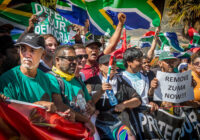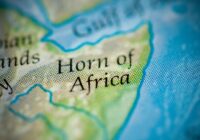Despite high-profile efforts to accelerate the development of Tanzania’s liquid natural gas assets, there remains no clear timeline for completion.
Tanzanian President John Magufuli ordered officials to accelerate work on a proposed liquefied natural gas (LNG) terminal in August 2016, but the outlook for the project remains uncertain amid a slow-moving and complex decision-making process. In late January, a senior official at state-run TPDC told reporters that the government hoped to conclude a so-called host government agreement with international oil companies (IOC) by 2018. The agreement will set out the key terms under which foreign companies Royal Dutch Shell, ExxonMobil, Statoil and Ophir will build and operate the $30 billion LNG plant, and talks have been underway since September 2016.
The timeline on the LNG terminal, a flagship project with the potential to have a transformative impact on Tanzania’s economy, has been pushed back repeatedly due to a myriad of regulatory and operational challenges.
Originally targeted for completion by the early 2020s, Norway’s Statoil warned in November 2016 that the project could be pushed back to 2026 at the earliest. Statoil’s Tanzania country manager, Oystein Michelsen, told Reuters that the project could be brought forward if the government was ready, but said a final investment decision would not be made within the next five years due to uncertainty over a stable investment framework and local ownership requirements.
The comments were a blow to Magufuli’s high-profile efforts to accelerate the long-delayed project. His office has made progress in resolving issues around land acquisition for the plant, but has failed to resolve delays that stem from more complicated concerns about regulations and the investment climate. Indeed, some of the president’s actions, including an anti-corruption drive that has ousted top officials with oversight of the industry, have slowed already complex negotiations with IOCs.
Economic uncertainty in Tanzania
Magufuli’s shifting economic policies have also damaged the wider investment climate, reinforcing a cautious approach within the industry. In a bid to decrease reliance on foreign aid and to fund an ambitious program to reach middle-income status by 2025, Magufuli is seeking $45 billion in new revenues to fund an ambitious industrial strategy. New taxes have been imposed on a range of sectors—including mining, banking, shipping and telecoms—prompting some foreign companies to reconsider their presence in the country, according to press reports. Some firms have also reportedly been pressured not to pass higher costs on to consumers and to invest in local projects such as smelters that businesses deem commercially unviable.
On February 2, the president said he would intensify a crackdown on tax evasion by large companies that businesses argue has led to unfair tax claim cases. The Economist said in May 2016 that an unnamed foreign company was given seven days to resolve a $5 million claim, and when it failed to do so, the funds were withdrawn directly from its bank account. Given the difficulty of taxing Tanzania’s vast informal sector, which the African Development Bank says accounts for 55% of gross domestic product (GDP), foreign investors and large companies are likely to face continued scrutiny and financial pressure as the drive to boost revenues intensifies.
The negative impact of disputes over taxes and revenues on the business climate is indicative of a wider failure of the current administration to fully consider the implications of the policies it has implemented. Underscoring this, in January the International Monetary Fund (IMF) warned in a report that uncertainty in the private sector over the government’s new economic policies, along with a failure to follow through on an ambitious public investment strategy, were among the main downside risks to growth.
Tanzania’s port of Dar es Salaam, a major hub for trade to landlocked East African countries, has lost significant business to rival terminals in the region after the government announced in 2015 that it would apply a VAT on goods shipped overland to neighboring countries like Zambia and Uganda. In a reversal of an informal agreement with operators, in June 2016 lawmakers ordered local and foreign-backed telecoms firms to list on the local exchange. The fact that one firm told the Financial Times that the decision had been made without any industry consultation reinforces concerns about an unpredictable and narrow policymaking process.
LNG project faces uncertain prospects
Recent government action in other areas has made it critical that investors use ongoing talks to secure provisions that protect their investments from future policy changes. The lack of clarity has only reinforced the need for a cautious and deliberate approach in the wake of other policies viewed critically by the industry.
 In December 2015, Statoil officials expressed concern about the uncertain impact of a new petroleum code approved several months earlier on existing contracts. Even as exploration continues, above ground challenges have made it increasingly unclear when the LNG project might be completed. Although exploration in both countries began in earnest in 2010, Tanzania appears to have increasingly fallen behind its rival gas-rich neighbor Mozambique, which despite its own delays approved changes to key contracts in December 2016 and hopes for a final decision on an export terminal this year.
In December 2015, Statoil officials expressed concern about the uncertain impact of a new petroleum code approved several months earlier on existing contracts. Even as exploration continues, above ground challenges have made it increasingly unclear when the LNG project might be completed. Although exploration in both countries began in earnest in 2010, Tanzania appears to have increasingly fallen behind its rival gas-rich neighbor Mozambique, which despite its own delays approved changes to key contracts in December 2016 and hopes for a final decision on an export terminal this year.
Years of discussion and unrealized promises about the economic benefits of Tanzania’s nascent gas industry have already contributed to the growth of unrealistic expectations among the public. For example, East African civil society group Twaweza said in August 2015 that some 17% of Tanzanians believed they would be employed in the sector, and some 53% incorrectly thought offshore discoveries were already producing. Majorities also said that natural gas will provide electricity supplies and improved living conditions, responses that may fail to fully consider the complexity of delivering such direct benefits.
Internationals nongovernmental organizations such as Oxfam have undertaken projects to promote transparency in the public discourse around LNG, but major challenges remain in managing expectations. Amid growing uncertainty over when, or if, the LNG project will be delivered, the government and industry face growing reputational risks should public attitudes harden. The 2013 protests in Mtwara over a gas pipeline reflect local sensitivity over natural resource projects, and if IOCs and the government are seen as having failed to deliver on past commitments, it could create a more contentious climate for investment in the oil and gas sector.
*[This article is based on a report by Protection Group International.]
The views expressed in this article are the author’s own and do not necessarily reflect Fair Observer’s editorial policy.
Photo Credit: Loonger
Support Fair Observer
We rely on your support for our independence, diversity and quality.
For more than 10 years, Fair Observer has been free, fair and independent. No billionaire owns us, no advertisers control us. We are a reader-supported nonprofit. Unlike many other publications, we keep our content free for readers regardless of where they live or whether they can afford to pay. We have no paywalls and no ads.
In the post-truth era of fake news, echo chambers and filter bubbles, we publish a plurality of perspectives from around the world. Anyone can publish with us, but everyone goes through a rigorous editorial process. So, you get fact-checked, well-reasoned content instead of noise.
We publish 2,500+ voices from 90+ countries. We also conduct education and training programs
on subjects ranging from digital media and journalism to writing and critical thinking. This
doesn’t come cheap. Servers, editors, trainers and web developers cost
money.
Please consider supporting us on a regular basis as a recurring donor or a
sustaining member.
Will you support FO’s journalism?
We rely on your support for our independence, diversity and quality.






